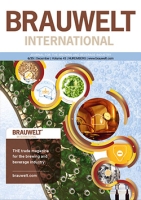The multitude of bottle and crate types and the large number of widely differing beverage containers and secondary packaging in the beverage industry is steadily increasing worldwide. Hardly any company today is prepared to forgo an individual brand presentation both in the returnable and non-returnable sector. For the processing of
The complete production process of alcohol free beverages, ready-to-drink teas or alcoholic mixed drinks will in the future be part of the competence of Krones. Already today the company offers engineering and fabrication of entire syrup rooms and mixing systems. A series of projects has recently been brought to a successful conclusion.
The Czechs’ love of beer – it not only manifests itself in the highest per-capita beer consumption in the world, but also in the fact that the first Pilsner was brewed here, in Pilsen. A new can filler in the internationally firmly established Plzensky Prazdroj brewery meets the performance required. Described in the following are its advantages and flexibility – two preconditions for further development as planned.
High increases | The Russian Efes succers story started in the early 90s. The high quality Efes Pilsener was exported into Russia, which made this country in an extremely very short time the most important export market for the Turkish brewery Group Efes. The logical decision was to invest in 1999, Efes Pilsener was one of the first beer brands to be brewed in Russia under licence. Today, the brewery group invests in modern packaging from KHS filling technology to meet the trend towards.
Cold Aseptic Filling (CAF) requires a filling plant that operates aseptically, with complete absence of germs in the filled containers and plant peripherals ahead of the filling plant that render the product to be filled completely germ-free thermally and keeps it such for a long period of time, before passing it on – cooled down again – to the filling plant. This is the only way of reliably achieving the increasingly long shelf lives of soft drinks, combined with the convenience of light plastic packaging, without addition of preservatives.
Beer drinking enjoyment depends on temperature and appearance, as well as on good taste. Dispensing from kegs has become established practice but damaged kegs or those handled incorrectly during transport can considerably diminish enjoyment of beer and lead to complaints and claims. This report is meant to show up weak points and describe possibilities of integrating a well functioning maintenance and control system in the plant.
Egg Brewery, located in Egg/Vorarlberg Austria, fills beer and lemonade in five different bottle types with various types of closures. The new BKM Varifill 24/KK/6/SV6 short-tube filler provides significant advantages for this medium-sized brewery. Together with data on commissioning, these are presented in the following contribution.
Breweries are currently increasingly confronted with a new challenge arising from continuing efforts of marketing departments to achieve greater product differentiation. Individually styled bottles on the market for filling the various products of a brewery create new framework conditions for handling of empties. In this article, a new integrated sorting line from Krones is presented.
As keg equipment from KHS Till is operating successfully in four Russian breweries, Heineken has now again opted for KHS Till keg equipment for the operation in St. Petersburg. This is a reflection of increasing sales to the catering trade in Russia. The plant is designed for 140 kegs per hour, it can handle 30 and 50 l kegs and can, if necessary, be extended to double the initial capacity. With an 8% market share and 6 million hl beer sales, Heineken is currently number 3 in the Russian beer market. ..
Up until such time as they are sold and used, beverage cans usually stand open in stores, on shelves and in similar areas. Impurities such as e.g. dust can easily be deposited on the can top.
The general consumer habit of drinking directly from the opened can, without first cleaning the contact area, is anything but hygienic.
A newly developed hygiene protection for beverage cans from the HN Group is a fully recyclable, pressed aluminium foil which customers know from bottleneck labelling. This provides every possibility of carrying print. Advertising such as thermo-colours, internal printing, watermarking can be carried out without any problem. The aluminium foils are delivered cut to size and withdrawn singly from a label stacker..


